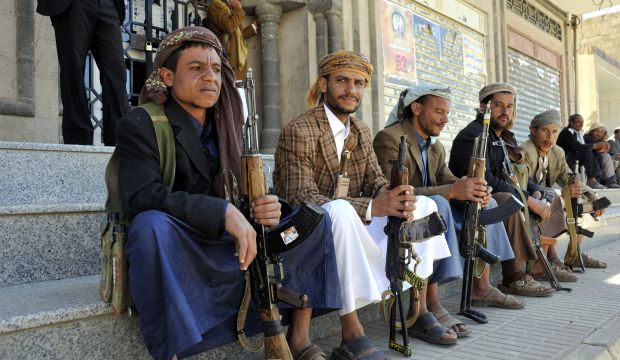
Gunmen loyal to the Houthi movement sit outside the headquarters of Sana’a province in Sana’a, Yemen, on October 19, 2014.
(EPA/Yahya Arhab)
Sana’a, Asharq Al-Awsat—Tribes from Yemen’s Ma’rib province have begun preparations to repel fighters loyal to the Houthi movement attempting to take control of the oil-rich region, local sources told Asharq Al-Awsat on Wednesday, following reports of a campaign by the Shi’ite movement to tighten its grip on the country’s oil infrastructure.
A local security source, who spoke on the condition of anonymity because he was not authorized to brief the media, said: “[Ma’rib] Tribes are preparing to defend their province following news of large numbers of Houthis marching from the neighboring Saada and Al-Jawf provinces.”
An attack on the strategic province will lead to grave consequences, as it will exacerbate tribal and sectarian problems, the source warned.
He said: “Such an attempt to storm Ma’rib will trigger a fierce war with particular tribal and geographical consequences which the Houthi brothers know well.”
Earlier this week Asharq Al-Awsat interviewed the governor of Ma’rib, Sheikh Sultan Al-Arada, who warned of Houthi plans to take control of the strategic province, which accounts for approximately 70 percent of Yemen’s oil production.
The Houthi movement has bolstered its military presence across Yemen since it took over the capital Sana’a in September. The Shi’ite movement has continued to push towards Ma’rib despite a recent agreement between Yemeni President Abd Rabbuh Mansur Hadi and their leader Abdul Malik Al-Houthi to avoid conflict in the province.
Meanwhile, the Gulf Cooperation Council (GCC) strongly condemned a bombing that killed dozens near a Sana’a police academy on Wednesday.
The secretary-general of the GCC, Abdullatif Al-Zayani, issued a statement on Wednesday expressing his condemnation of the “heinous crime that contradicts all moral values and humanitarian principles.”
No group has claimed responsibility for the attack, which killed at least 37 and injured 66 more, but Yemen has seen similar attacks by militants from Al-Qaeda in the Arabian Peninsula (AQAP), which has launched an increasing number of attacks on various targets in Yemen since the rise of the Houthis.
The US embassy in Yemen also condemned the attack, which it said “reveals the nihilistic vision and depravity of terror groups operating in Yemen.”
In other news from Sana’a, militants affiliated with the Houthi movement stormed the house of Faisal Mukarram, the editor-in-chief of Al-Thawra newspaper, a Yemeni pro-government daily. The attackers forced Mukarram to submit his resignation in what was seen as an attempt by the Shi’ite group to curb freedom of press in Yemen.
Meanwhile, President Hadi appointed a prominent Salafist figure as a minister of state on Wednesday. The leader of the Salafist-leaning Al-Rashad Party, Mohammed Musa Al-Amery, took the constitutional oath before Hadi on Wednesday, becoming the first Salafist figure to hold a senior government position in Yemen.
